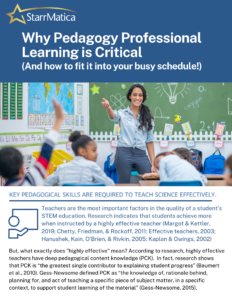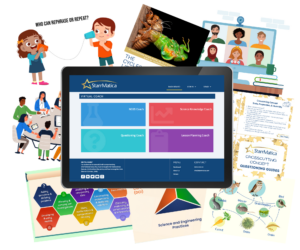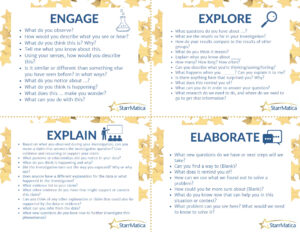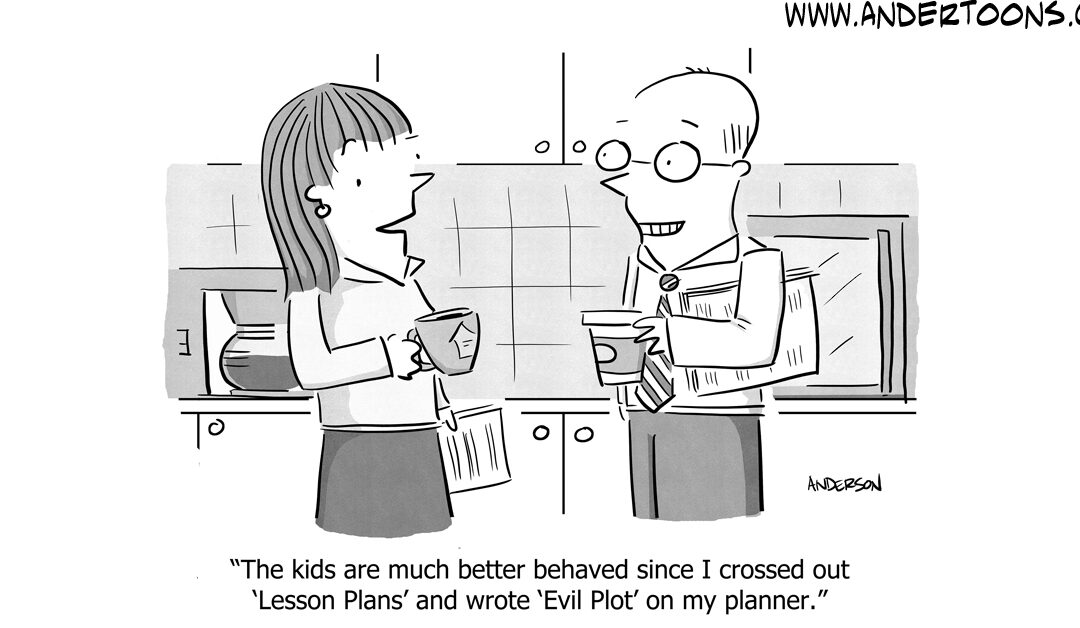Questioning is one of the weakest areas of science instruction for a majority of teachers. Even when a lesson is otherwise well-designed (ie: high quality curriculum) fewer than one in five lessons incorporate questioning that is likely to move student understanding forward (Weiss et al., 2003).
Yet, research shows that teachers’ questions are essential to an effective science classroom. In fact, Wilen and Hogg suggest that inquiry teaching is “crucially dependent upon the teacher’s ability to ask questions that are congruent to the levels of thinking desired.” Highly effective science teachers are able to ask productive questions that move student thinking forward and are able to use talk moves to facilitate student led classroom discussions.
 If you’d like a concrete example of what effective questioning sounds like in the context of a science lesson, check out my article: Why Pedagogy Professional Learning Is Critical. In it, I compare the same lesson being taught by two different teachers – one who uses effective questioning and one who does not.
If you’d like a concrete example of what effective questioning sounds like in the context of a science lesson, check out my article: Why Pedagogy Professional Learning Is Critical. In it, I compare the same lesson being taught by two different teachers – one who uses effective questioning and one who does not.
Bottom line: The quality of a teacher’s questioning is the difference between a lesson that effectively promotes active student sense-making and one that spoon feeds content to disengaged students.
So, you may be thinking, I’m not sure how to find the time to work on my questioning. I’m already overwhelmed. The good news is that effective questioning is a high-impact teaching strategy that will immediately improve student thinking and discourse, not only in science, but in all content areas. So if you are able to carve out some time to master this skill, it is going to increase the effectiveness of everything you teach. It is a skill worth the investment – In fact, I believe that it should be your top priority for professional learning because of the transformational effect it will have on your students.
Here are two concrete steps you can take today to begin your journey toward mastering questioning:
#1 Work on one aspect of questioning at a time. In StarrMatica’s Virtual Science Coach, teachers are empowered with the knowledge of the importance of questioning, how to ask productive questions, how to respond effectively to student answers, how to facilitate productive classroom discourse, how to use “talk moves,” and how to ask appropriate questions during each phase of a 5Es lesson. (You can find out more about this professional learning opportunity on our website.) As you can see, there are a lot of faucets to effective questioning, but you don’t have to learn about all of them all at once. Start with one aspect, learn about it, practice it, apply it to your classroom, and once you are comfortable with that skill, then tackle another aspect of questioning.
Action Plan: You could start by reading the Talk Science Primer and applying the concepts to your classroom discussions.
#2 Develop “cheat sheets” to guide your practice. As with everything in life, practice makes progress. It will take some time for your questioning skills to become second nature. In the meantime, create some “cheat sheets” for yourself that list different talk moves you’d like to use or questions you can ask in different situations. Even questioning masters craft effective questions ahead of time because the best questions are not crafted while standing at the front of the room with 20-40 sets of eyeballs staring you down.
Action Plan: Download the set of 5Es question stems at the end of this blog post and have them available while you teach. (And really, they aren’t 5Es specific questions – so they are helpful no matter what structure you use to organize your lessons.) Standing at the front of the class with a clipboard is perfectly acceptable, and if you let your students in on your secret papers, it models for them that even the teacher is always trying to learn new things.
 Questioning is just one aspect of StarrMatica’s Virtual Science Coach Professional Learning. Our bite-sized coaching” focuses on research-based teaching strategies proven to raise science achievement – regardless of curriculum. And online sessions – 20 minutes or less – combined with optional small group activities – allow you to fit professional learning into your busy schedule. Rather than ineffective one-time workshops that don’t change your practices long-term, our consistent curriculum ensures skills mastery over time.
Questioning is just one aspect of StarrMatica’s Virtual Science Coach Professional Learning. Our bite-sized coaching” focuses on research-based teaching strategies proven to raise science achievement – regardless of curriculum. And online sessions – 20 minutes or less – combined with optional small group activities – allow you to fit professional learning into your busy schedule. Rather than ineffective one-time workshops that don’t change your practices long-term, our consistent curriculum ensures skills mastery over time.
You can learn more about the Virtual Science Coach by visiting our website, and you can schedule a personal online walk through here.

Enter your information below to receive your complimentary 5Es question stems “cheat sheet.” Designed as cards, you can print these on cardstock, cut them apart, and keep them handy to guide your questioning during each phase of your lesson.


